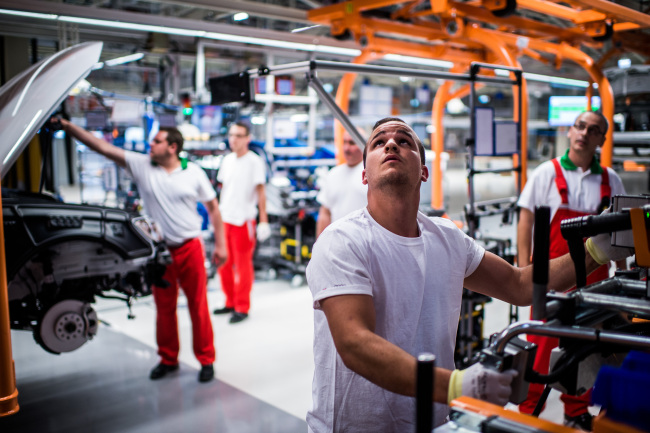Global carmakers beef up output in Hungary
Korean firms lured by cheaper labor costs, generous incentives
By Korea HeraldPublished : Oct. 5, 2014 - 21:00
BUDAPEST ― Hungarian officials were disappointed when Hyundai Motor decided to locate its European production base in the Czech Republic in 2006.
In a highly publicized bidding war, the two countries closely contested for the lucrative deal. But Hungary, already home to Audi, Opel and Suzuki plants at the time, failed to defeat its regional rival.
“We were very disappointed about the result,” said Gobor Simon, a director of the Hungarian Investment Promotion Agency based in Budapest, recalling the tight race.
“But there are no borders in the EU. Thanks to the country’s geographical benefits and flexible labor system, a growing number of car and car-parts makers, including those from Korea, are now flocking to Hungary.”
In the past, the Czech Republic and Poland were favored by carmakers looking to open production plants in the region. But more recently, Hungary has emerged as a competitive destination.
Since the 1990s, the Hungarian government has poured considerable resources into hosting global companies’ plants, especially automotive factories, to create more jobs and fuel economic growth.
Thanks to these efforts, several carmakers and their suppliers are now based in Hungary and boosting output there.
In a highly publicized bidding war, the two countries closely contested for the lucrative deal. But Hungary, already home to Audi, Opel and Suzuki plants at the time, failed to defeat its regional rival.
“We were very disappointed about the result,” said Gobor Simon, a director of the Hungarian Investment Promotion Agency based in Budapest, recalling the tight race.
“But there are no borders in the EU. Thanks to the country’s geographical benefits and flexible labor system, a growing number of car and car-parts makers, including those from Korea, are now flocking to Hungary.”
In the past, the Czech Republic and Poland were favored by carmakers looking to open production plants in the region. But more recently, Hungary has emerged as a competitive destination.
Since the 1990s, the Hungarian government has poured considerable resources into hosting global companies’ plants, especially automotive factories, to create more jobs and fuel economic growth.
Thanks to these efforts, several carmakers and their suppliers are now based in Hungary and boosting output there.

German luxury carmaker Audi is a big name in the market, where it has operated a plant since 1993. Last year, the company produced 125,000 Audi TT sports cars and roadsters and A3 sedans. In response to the rising demand for the premium models, the carmaker invested an additional 900 million euros ($1.1 billion) in June to expand the plant.
Mercedes-Benz, which started the operation of its Hungarian plant in 2012, added a third shift at the plant to meet the growing demands for the A- and B-Class compact models. The carmaker, which employees about 3,000 people at the factory, produced more than 100,000 vehicles last year.
Hosting a slew of premium German carmakers is a boon for Hungary, which wishes to lure top-tier parts suppliers and their subcontractors.
Korea’s Hankook Tire is one of the biggest investors. As part of its global expansion plan, the tire-maker set up a Hungarian plant in Racalmas in 2007. Its annual production capacity is 17 million tires and about 2,500 people work there.
Last year, the company announced an additional investment worth $400 million over the coming two years. It was one of the largest foreign investments made in Hungary that year.
“There has been a growing number of inquiries from Korean firms recently,” said Gyula Bogathy, a senior adviser for the investment promotion agency.
“They are seeking opportunities to work with global companies, not just with Hyundai. Talks with two Korean parts companies are also nearing an agreement,” he added, declining to further elaborate.
Cheaper labor costs are the key reason why carmakers are attracted to Hungary.
According to the Eurostat statistics office, the hourly labor cost in Hungary is 7.60 euros, while the EU average is 23.10 euros. The figure is even lower than those of the Czech Republic and Slovakia.
Despite the lower labor cost, officials said, labor productivity is above the EU average as the government has adopted a German apprentice system across industries for students to receive on-site training through schools.
“The flexible labor-management relationship is also expected to appeal to Korean firms,” the official added, referring to the almost seasonal labor strikes at Korean factories that have led to severe production losses for export-driven companies like Hyundai Motor.
The government’s cash incentives and tax benefits are also unrivaled within the region, so much so that the generous benefits sometimes become a target of EU surveillance.
Hungary imposes only 10 to 19 percent corporate income tax on revenue. The figure compares to 38 percent of Japan, 24.2 percent of Korea, 19 percent of the Czech Republic.
“It is not just about money. We offer a competitive package consisting of cheaper labor, well-trained workers, abundant infrastructure and a common market of more than 500 million people,” said Simon.
He showed confidence in attracting more international firms, hinting that more benefits would be given to automotive companies as the government shifts its budget toward the manufacturing sector.
By Lee Ji-yoon, Korea Herald correspondent
(jylee@heraldcorp.com)
-
Articles by Korea Herald






![[KH Explains] Can tech firms' AI alliances take on Nvidia?](http://res.heraldm.com/phpwas/restmb_idxmake.php?idx=644&simg=/content/image/2024/05/07/20240507050619_0.jpg&u=)


![[Grace Kao, Meera Choi] Has money displaced romance on dates?](http://res.heraldm.com/phpwas/restmb_idxmake.php?idx=644&simg=/content/image/2024/05/06/20240506050233_0.jpg&u=)








![[K-pop’s dilemma] Time, profit pressures work against originality](http://res.heraldm.com/phpwas/restmb_idxmake.php?idx=652&simg=/content/image/2024/05/08/20240508050705_0.jpg&u=20240508171126)
![[Today’s K-pop] NCT Dream to drop pre-release from 2nd Japan single](http://res.heraldm.com/phpwas/restmb_idxmake.php?idx=642&simg=/content/image/2024/05/08/20240508050725_0.jpg&u=)